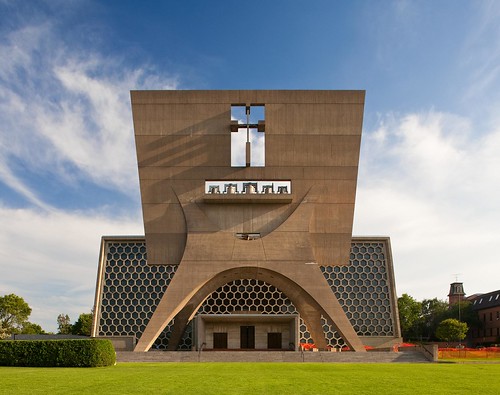On March 7th, 1965, Pope Paul VI publicly
celebrated Mass in Italian for the first time in accordance with the norms
established by the Second Vatican Council. It was a momentous event in the
modern history of the Church. It was the first time a Pope said Mass in the
vernacular since the Council of Trent in 1545-1563. In fact the Mass was said
in Latin since the early fourth century. On March 7th, Pope Francis
commemorated the fiftieth anniversary of that first Mass in the vernacular
saying “It was really a courageous move by the Church to get closer to the
people of God so that they could understand well what it does, and this is
important for us: to follow Mass like this.”
I remember that period of time fifty years ago. We did not
have the internet to catch up on the latest goings on in the world. In fact, living
on a farm in Minnesota, we had just upgraded from our crank telephone and
gotten a radio powered by electricity. Any information we got was mostly from
the paper. It was exciting times though as I was graduating from high school
and soon going off to college. I remember the priest asking me if I would help
guide the congregation in the new responses in answer to what the priest was
saying. I stood at the ambo trying to lead everyone in something I was learning
just as they were learning it. It was exciting. We were actually able to
participate instead of just sitting there and reading the English version of
the Latin from our missalettes. Actually, before the English came in, most
everyone just sat or knelt when they were supposed to and did nothing other
than attend Mass and maybe go to Communion if they had gone to Confession the
week before. It was a time of change.
In his homily, Pope Francis said, “You cannot turn back, we
have to always go forward and who goes back is making a mistake. Let us give
thanks to the Lord for what he has done in his Church in these 50 years of
liturgical reform.” There has been a lot of change. One of the big changes was
turning the altar around to face the people. Before that the priest had his
back to the people more or less being separated from them. Another important
change was being able to receive Communion in the hand. Before that we had to
kneel at the Communion rail and have the host placed in our mouth. Heaven
forbid if we ever touched the host or chewed it. Some of you may remember
having the host stick to the roof of your mouth but we dare not touch it with
our finger or teeth. It was a different time.
In college my junior and senior year, we had a priest as our
faculty resident (the president of the college). On Sunday evening he’d go
around to everyone and ask if they had gone to Mass. Most had not so he had all
of us come down to his room, he’d take a loaf of Johnnie bread (made by the
monks at St. John’s University), pull a bottle of wine from his wine rack and
we’d sit around in a circle and he’d celebrate Mass. He’d give his homily and
then we would have a discussion on how the readings pertained to our lives. It
was very much how I envisioned the first Christians may have gathered for the
Eucharist. I have to say it spoiled me and it took me a while to go back to a
traditional Mass in a Church. Some of those practices were experimental and not
in existence today now but it was very meaningful.
The Second Vatican Council’s Constitution on the Sacred
Liturgy, :Sacrosanctum Concilium,” defined the liturgy as “the primary and
indispensable source from which the faithful are to derive the true Christian
spirit.” We as Catholics are so blessed to have Mass where bread and wine are
transformed into the Body and Blood of our Lord Jesus Christ. It is the “source
of life and light for our journey of faith.” The pope said that commemorating
the first papal Mass in the vernacular rather than Latin would remind people
that the house of God is meant to be a source of spiritual strength, where they
can hear his word and feel “not like foreigners but as brothers and sisters who
are united in Christ.” We are truly blessed to have the Mass in English and
participate in it.




Comments
Post a Comment
Please THINK before you write!